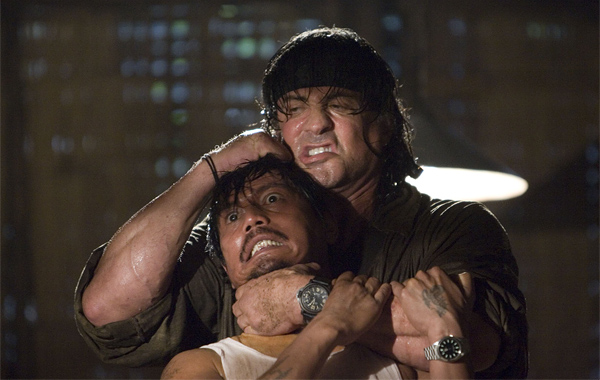Few things seem gray anymore. Perception has grown black and white. There is good and evil, Republican and Democrat, tasteful and tasteless, comedy and drama, etc. Middle ground, ambiguity seem unsettling, out of place. As time passes and our brains need to neatly file information into definitive compartments, we sum up our feelings of a particular subject, give it that label and put it away, forever stored as a summation. The action genre has fallen victim to this tendency. Today the action movie illicits thoughts of guns, stunts and explosions all surrounding impossibly cool heroes in “movies for guys who like movies.” And, in thinking back without thinking, few films seemingly represent this better than Rambo.
20 years since Rambo III, Sylvester Stallone reintroduces audiences to a someone we thought we knew but really forgot through a character that the world once knew but ultimately forgot. Living just outside of Burma, Rambo has become separated from the world. Living in the jungle, John Rambo has long since separated himself from humanity. And for good reason: just up the river lies the genocide of the Burmese people, ravaged by militant militias, hunted, toyed with for the sheer thrill of exploiting power over other people. Some of the movie’s most violent scenes depict the horrendous acts thrust upon these people. Stallone, smartly, opens the movie with actual footage of the horrors in Burma. Dead children, soldiers kicking beaten people in the head. The first five minutes of the movie completely obliterate the notion that this is the fantasy, cliche action pic we’ve come to think as Rambo. He shows us this character means something in this real world. And through this footage, Stallone gives us the film’s first polarizing view: evil.
Rambo is living his life as a snake herder, finding venomous snakes in the jungle and selling them to charmers. Here he meets a group of religious missionaries (representing good) who want to enlist Rambo and his boat to take them up river into Burma so they can help the victims of the country. Rambo sees their mission as hopeless and their idealism as naivete. He asks if they are going to bring weapons. The answer of no reveals Rambo’s take on humanity as a whole: “Then you’re not changing anything.”
Eventually they get him to take them up river and as they are bringing aid and religion to the Burmese, the village is attacked and those that aren’t killed (there are few) are taken hostage. My summarizing the events would make this sound like a cliche action movie: mercenaries are hired to get the missionaries back, Rambo joins them and ultimately becomes the catalyst to free the missionaries while dispensing violence upon the bad guys. However, Stallone skillfully puts together a story that shows a man who has given up on humanity forced to face his moral ambiguity, to save those who he had given up hope on through means by which he himself is frightened of and quite possibly hates himself for being capable of. Through applaudable scripting and directing, Sylvester Stallone has Rambo, the character and the film, transcend the weight of the action movie albatross and creates a character study of an individual who is forced to face himself and find out whether he has a place in the world again.
Now all of this sounds incredibly philosophical, but rest assured that when it’s time to kick ass, John Rambo kicks ass. No punches are pulled as the last 20 minutes of the film unfurls across the projector. If this is the last blood Rambo is going to spill, Stallone made it count. Visceral and climactic, the violence feels like the release of the pent up emotions that have been building inside this character for the past 20 years. And we, the audience, feel a release and reward as we relate to being in the ambiguous middle of the good and evil and the other stark contrasts that we face each day. Yes, ladies and gentlemen, John Rambo is us.
Rambo seemingly brings a close to another iconic character that helped define a genre. And with this bookend, Sylvester Stallone provides us with a chance to see that action movies aren’t low brow and action stars shouldn’t be compartmentalized. I loved Rambo and cannot wait to find myself in the theater to see it again.
– justin

